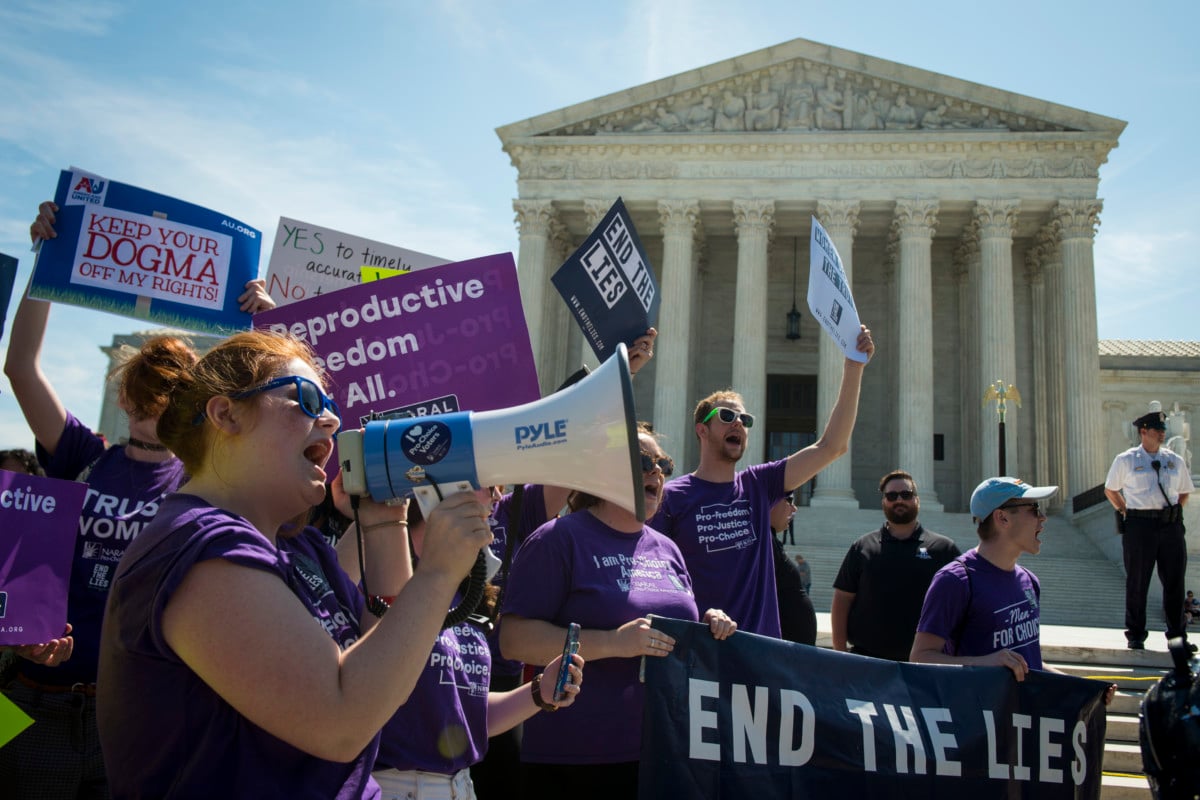In a 5-4 decision, the United States Supreme Court has ruled against the state of California in NIFLA v. Becerra, a case pitting crisis pregnancy centers run by anti-abortion activists against a California law requiring medical license disclosures and information on where to obtain free abortions in the state.
The slim majority sided with anti-abortion CPCs, and the court ruled that mandating these centers provide information about abortion violated their free speech. The Supreme Court also concluded that the law infringed on CPC employees’ truly held religious beliefs that abortion is a moral wrong in which they cannot directly or indirectly participate.
The case escalated the National Institute of Family and Life Advocates, or NIFLA, challenge to California’s 2015 FACT Act, which required clinics that operate as medical pregnancy centers to disclose upfront that they are not licensed if there’s no licensed medical staff on site. The FACT Act also required CPCs to divulge if they are licensed to provide information about accessing free abortions in the state, should the patient choose not to continue the pregnancy.
NIFLA and other CPCs called the requirement government-compelled speech, while the state maintained that it was “professional speech” which can be legally mandated.
The case offered a rare majority ruling written by Justice Clarence Thomas, a Reagan-era appointee — and one best known for being the most silent member of the current Supreme Court and spouse of right-wing activist Ginni Thomas.
Emma Green writes at the Atlantic:
In his decision for the majority, Justice Clarence Thomas agreed that the FACT Act likely violates the First Amendment. The law ‘imposes a government-scripted, speaker-based disclosure requirement that is wholly disconnected from the State’s informational interest,’ he wrote. Because the law selectively regulated only certain kinds of facilities, Thomas said, it ran the risk of only limiting the speech of those who disagree with the state’s views on abortion.
The crux of the majority’s argument appears to rest on the idea that because there is no actual medical “procedure” performed at a CPC, the government can’t regulate professional speech. It’s a thread-the-needle-type justification that brilliantly allows the court to sidestep the logical follow-up question of why forcing abortion providers to recite state-mandated scripts — ones that claim abortion could cause breast cancer or suicide and tell patients a litany of other coercive and factually false statements — isn’t also a free speech violation.
In SCOTUS-world, abortion is a medical procedure, and speech can be compelled. Being pregnant and not getting an abortion — or being talked out of an abortion — isn’t a medical procedure, so in that case all rules are moot.
Anti-abortion activists are rightfully claiming this as a major victory — more of a win for free speech than one that furthers their goal to end access to safe, legal abortion.
According to NPR, Penny Nance, CEO of Concerned Women for America, stated:
To be clear, this case was not about abortion. Malicious abortion politics definitely were the motivation behind it, but the case centered on the inappropriate mandate of the state compelling pro-life clinics to promote abortion in violation of their consciences. The case was about forced speech.
It may not have been about abortion originally, but as we are clearly seeing from moves in the Trump Department of Health and Human Services, it’s always about abortion in the end.
Being able to opt out of state requirements for health centers due to religious objections will come into play on an even more vast scale as the new rules for Title X funding come down the pipeline. After all, these rules have already been drafted to allow CPCs the opportunity to obtain federal Title X dollars for services for the poor and uninsured — despite the fact that they will not offer or refer for hormonal contraception, as well as provide misleading information while pushing for abstinence-based sexual health habits.
The Supreme Court just said that the government can’t force CPCs to offer full-spectrum, accurate reproductive health information when it comes to potentially ending a pregnancy. What are the odds that they will rule differently when the case is about birth control options, instead?
My guess is that we’ll find out in just a few years.
Join us in defending the truth before it’s too late
The future of independent journalism is uncertain, and the consequences of losing it are too grave to ignore. To ensure Truthout remains safe, strong, and free, we need to raise $46,000 in the next 7 days. Every dollar raised goes directly toward the costs of producing news you can trust.
Please give what you can — because by supporting us with a tax-deductible donation, you’re not just preserving a source of news, you’re helping to safeguard what’s left of our democracy.
